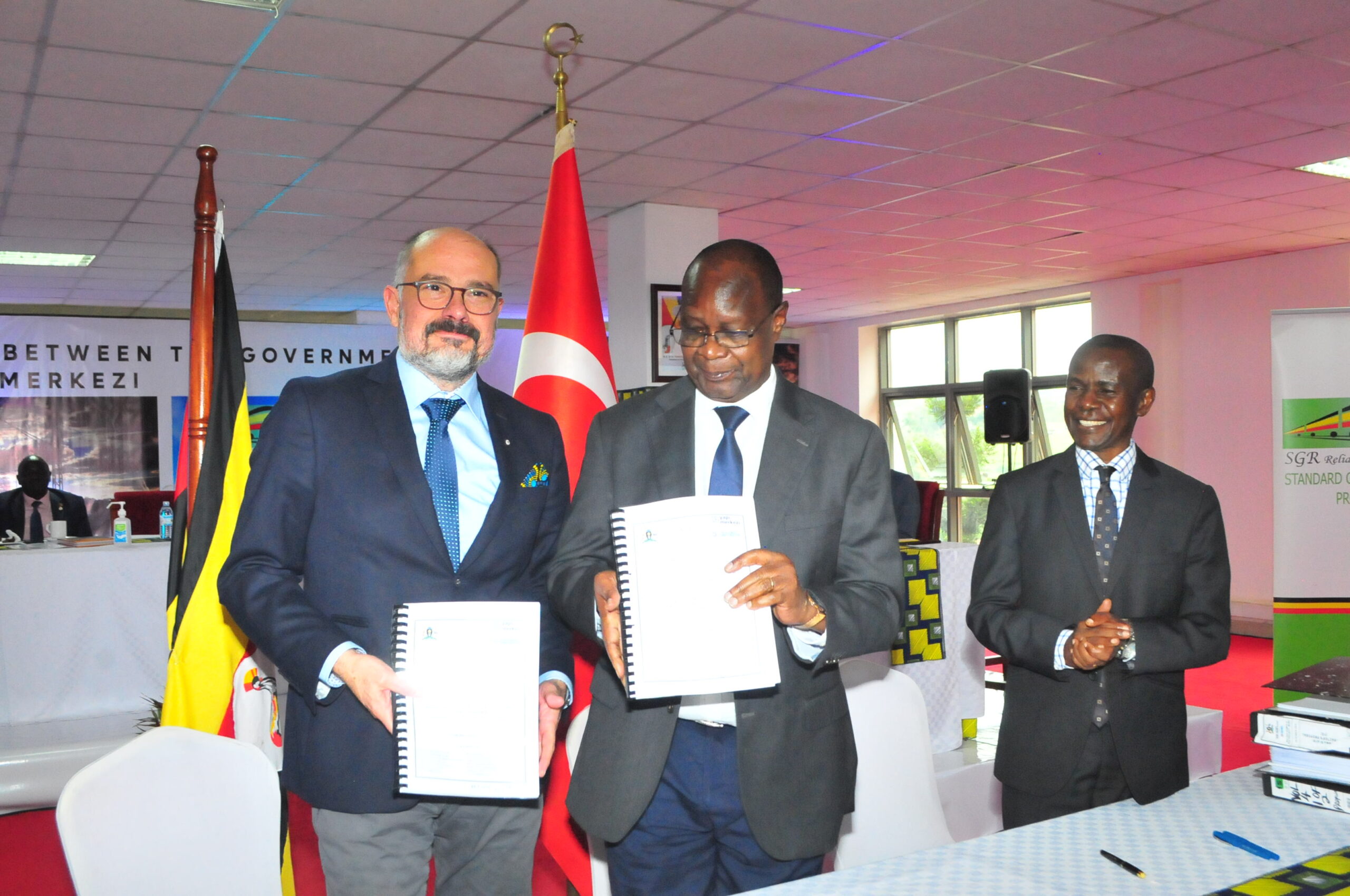KAMPALA, October 14, 2024 – The Government of Uganda, through the Ministry of Works and Transport [MoWT], has today signed an EPC/Turnkey contract with Yapi Merkezi for the construction of a 273-kilometer Standard Gauge Railway [ SGR ] linking Kampala to Malaba. This agreement follows successful negotiations with the Turkish firm.
Engineering, Procurement, and Construction [EPC] contracts are designed to relieve the owner of project management pressures. Under this model, buyers hire a contractor to oversee the design, planning, and execution of a project from start to finish. The contractor is responsible for delivering a turnkey system or facility that meets agreed-upon quality standards, timelines, and budgets.
Officials report that nearly 150 kilometers of land has already been acquired by the government, with land acquisition nearing completion in Tororo, Butaleja, Namutumba, Luuka, Iganga, Mayuge, Jinja, and Buikwe. The focus will soon shift to the final three districts of Mukono, Wakiso, and Kampala.
This project marks a significant advancement in Uganda’s transportation network, facilitating faster and more efficient movement of goods and passengers between Kampala and the Kenyan border. Uganda’s neighbours, Kenya and Tanzania, are already utilising the SGR.
Minister of Works and Transport, Gen. Katumba Wamala, stated, “I urge Yapi to ensure compliance with local content provisions. We have local producers of steel, cement, and more. Your support is crucial, and they should feel the impact of this project.”
The SGR train is expected to travel from Mombasa to Kampala in one day, ensuring reliability, safety, and speed. Trains will operate at approximately 100 kilometers per hour, each capable of carrying about 216 containers—equivalent to around 200 trucks—thus significantly reducing road maintenance costs.
“I know the challenges you [Yapi Merkezi] have faced, but we are now moving forward. I thank Gen. Katumba for his leadership and the SGR team for their efforts,” remarked Finance Ministry Permanent Secretary and Secretary to the Treasury, Ramathan Ggoobi.
The Permanent Secretary of MoWT, Bageya Waisa, represented the Government of Uganda, while Dr. Erdem Arioglu, Vice Chairman of Yapi Merkezi, represented his company during the contract signing.

Currently, transporting a 40-foot container by road from Mombasa to Kampala costs approximately US$3,500, whereas rail transport will be just US$1,500 when the SGR is operational, allowing for significant savings and efficiency in cross-border trade.
In April 2017, preliminary estimates for the entire Uganda SGR Project, covering 1,724 kilometers, were quoted at Shs 45.6 trillion (approximately US$12.8 billion). The Malaba–Kampala section alone, measuring 273 kilometers with associated train stations and railway yards, is budgeted at US$ 2.3 billion.
Background
In June 2013, the first infrastructure summit of the Presidents of Kenya, Rwanda, and Uganda, held in Uganda, established mechanisms for accelerating the development of the SGR system linking Rwanda and Uganda to the port of Mombasa, aiming to foster socio-economic transformation in East and Central Africa.
This led to the signing of a Tripartite Agreement for the development and operation of a Standard Gauge Railway between Mombasa, Kampala, and Kigali, with branch lines to Kisumu [Kenya] and Pakwach/Gul-Nimule [Uganda] in August 2013. The Republic of South Sudan joined the agreement in May 2014, extending the line to Juba.
To facilitate the development and operationalization of a seamless railway network from Mombasa to Kigali and Juba, the 3rd Joint Communiqué of the Northern Corridor Integration Projects directed the Partner States to develop a Standard Gauge Railway Protocol for its operations. This Protocol was signed by Kenya, Uganda, South Sudan, and Rwanda in May 2014.
The overarching objective is to jointly develop and operate a modern, fast, reliable, efficient, and high-capacity railway transport system, enhancing regional competitiveness, expediting economic growth, and facilitating the efficient movement of freight and passengers to accelerate trade and services.
https://thecooperator.news/eac-states-agree-to-boost-sgr-development-through-shared-funding/
Buy your copy of thecooperator magazine from one of our country-wide vending points or an e-copy on emag.thecooperator.news
-
-
-
-
